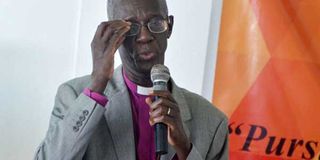acts can be influenced by bias and opinion in reporting news

EACC Chairman Eliud Wabukala. Some readers objected to my statement that to call Bishop Wabukala “a sycophant” because he sent a congratulatory message to President Uhuru Kenyatta is an opinion, not a statement of fact. FILE PHOTO | NATION MEDIA GROUP
What you need to know:
- They objected to my statement that to call EACC chairman Eliud Wabukala “a sycophant” because he sent a congratulatory message to President Kenyatta is an opinion, not a statement of fact.
In other words, they believe the good bishop is a sycophant.
My article was not concerned with the propriety of using public funds.
My concern was that the reporter presented an opinion as a fact.
Some readers were unhappy with my article, “Facts are sacred, comment is free the rule in reporting news,” published on December 1.
One said my comments were “mischievous, misplaced and scandalous”.
They objected to my statement that to call Ethics and Anti-Corruption Commission chairman Eliud Wabukala “a sycophant” because he sent a congratulatory message to President Uhuru Kenyatta is an opinion, not a statement of fact.
In other words, they believe the good bishop is a sycophant.
“The question is why an independent institution should spend public money to play partisan politics,” wrote Daniel Njaga.
“It’s that simple. The EACC should have nothing to do with politics or presidential candidates or parties. To use public taxes to congratulate the president-elect is sycophancy.”
George Marenya was even more explicit.
NORMAL EXERCISE
He said: “The thrust of your argument is that congratulating people is a normal exercise since we are simply being happy for the other person. Such an argument misses the point. Taken to its logical conclusion, it would mean that even a judge, is at liberty to offer such messages.”
EACC exists to receive complaints against members of the Executive of which the President is head, he noted, and there is “a serious need for impartiality and the perception thereof.”
He said because of the “issues of ethics”, which he presides over, readers are bound to ask whether Archbishop Wabukala would be impartial if he was confronted with ethical questions regarding President Kenyatta’s election.
“Was (is) he alive to the polarising nature of our last election? Why does he want to enter the fray as a partisan?
These must have been the questions exercising your reporter.
To pillory him or her for doing her work within the bounds of professionalism is not only unacceptable but mischievous, misplaced and scandalous,” Mr Marenya wrote.
OPINION
My article was not concerned with the propriety of using public funds.
My concern was that the reporter presented an opinion as a fact.
Reporters writing a factual news story are required to keep their opinions out of the story.
If the Nation reporter thought it was relevant, he could have said Archbishop Wabukala sent a congratulatory message and leave it at that. Readers would then draw their own conclusions.
Logically, one cannot equate the sending of a congratulatory message with sycophancy.
The Cambridge Dictionary defines sycophancy as praising people in authority in a way that is not sincere, usually in order to get some advantage from them.
Facts are verifiable, opinions are not. Examples: “Eliud Wabukala was born in Bungoma in 1951” is a fact because it can be checked and verified, while “Those who criticise Eliud Wabukala are not even fit to clean toilets at Integrity Centre” is an opinion because it cannot be proved right or wrong. Opinion is what a person thinks, feels or believes.
DIFFERENCES
Readers must be able to tell which statements are fact and which are opinion. It’s not always easy, however, to see the differences. Sometimes an opinion can be both fact and opinion.
Things are not always black and white. In news reporting facts can be influenced by opinion and bias. The reporter chooses what to present. That in itself can amount to an opinion and a judgment of the story.
For example, if a reporter chooses to tell readers that Wabukala worked as an untrained teacher at Butonge Secondary School and omits to say he was an academic dean at St Paul’s Theological College in Limuru, that can influence our perception of him.
As public editor I have no problem with Mr Njaga’s or Mr Marenya’s opinions, belief, feeling and attitude, just like I would not have had any problem with the Nation reporter if he had expressed the sycophancy accusation as an opinion instead of presenting it as a proven fact or truth. Readers need to know what is fact and what is opinion in order to evaluate the reliability and usefulness of a news story.
Send your complaints to [email protected]. Text or call 0721 989 264.




